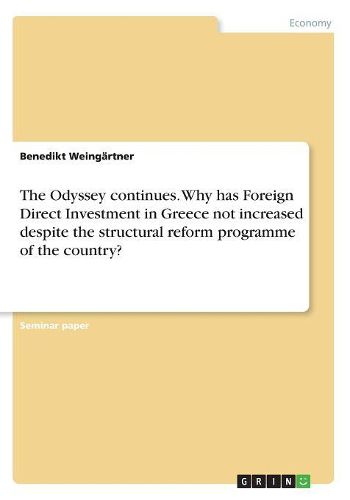Readings Newsletter
Become a Readings Member to make your shopping experience even easier.
Sign in or sign up for free!
You’re not far away from qualifying for FREE standard shipping within Australia
You’ve qualified for FREE standard shipping within Australia
The cart is loading…






Seminar paper from the year 2017 in the subject Economics - International Economic Relations, grade: 16/20 ( sehr gut ), College of Europe, language: English, abstract: After having experienced an economic boom at the beginning of the 2000s subsequent to the admission to the Eurozone, which had been however mainly driven by low interests on financial loans to the private and the public sector, Greece became de facto insolvent in 2010. In the aftermath of a global financial, banking and economic crisis, the country’s public finances became problematic to an extent at which private investors were only willing to lend money to Greece at interest rates which it could no longer afford to pay. An official bankruptcy could only be prevented by a financial rescue programme granted by the other Eurozone members and the International Monetary Fund in May 2010, giving bilateral credits summing up to 110 billion Euros in order to service existing debt. The bailout programmes were granted on the condition of a cash for reform approach. One objective of this approach was to create economic growth and new jobs in the country afflicted by high unemployment rates for decades. Many economists however stated that Greece could only sustainably overcome its economic and public debt crisis if the country was to become more attractive for Foreign Direct Investment (FDI).
$9.00 standard shipping within Australia
FREE standard shipping within Australia for orders over $100.00
Express & International shipping calculated at checkout
Seminar paper from the year 2017 in the subject Economics - International Economic Relations, grade: 16/20 ( sehr gut ), College of Europe, language: English, abstract: After having experienced an economic boom at the beginning of the 2000s subsequent to the admission to the Eurozone, which had been however mainly driven by low interests on financial loans to the private and the public sector, Greece became de facto insolvent in 2010. In the aftermath of a global financial, banking and economic crisis, the country’s public finances became problematic to an extent at which private investors were only willing to lend money to Greece at interest rates which it could no longer afford to pay. An official bankruptcy could only be prevented by a financial rescue programme granted by the other Eurozone members and the International Monetary Fund in May 2010, giving bilateral credits summing up to 110 billion Euros in order to service existing debt. The bailout programmes were granted on the condition of a cash for reform approach. One objective of this approach was to create economic growth and new jobs in the country afflicted by high unemployment rates for decades. Many economists however stated that Greece could only sustainably overcome its economic and public debt crisis if the country was to become more attractive for Foreign Direct Investment (FDI).